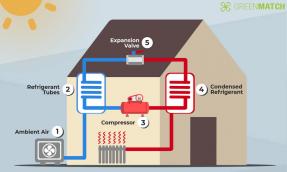Composting 101: Tips for Everyday Composting at Home (You Can Do It!)


Green Tips For Composting At Home:
If you’re thinking about taking up more green living practices, composting can be a great place to start. While composting may seem mysterious or complicated, it’s actually a simple and natural process:
Composting is when organic plant or animal material decomposes. If you’ve ever taken a hike in the woods, you’ve already experienced composting! In nature, plant and animal matter are constantly decomposing, creating fertile soil for more plants and tree to grow and flourish. Backyard composting is simply when one intentionally decomposes organic materials to use in a garden or yard. This practice is so easy; anyone can compost! And since food scraps and yard waste currently make up 20 to 30 percent of what we throw away, it makes environmental sense to compost. Making compost keeps these materials out of landfills where they take up space and release methane, a potent greenhouse gas.
The key to composting is to maximize your composting practice, don’t worry this isn’t difficult to do. So where does one draw the line between healthy, fertile compost and icky garbage? Check out these simple composting overview and tips to find out:
What are the Benefits of Composting?
- Enriches soil, helps retain soil moisture and deters plant disease and pests
- Reduces the need for chemical fertilizers
- Reduces methane emissions from landfills and lowers your carbon footprint
- By putting carbon and nitrogen back into the soil, composting fortifies the production of beneficial bacteria and fungi, which help break down organic matter to create a more nutrient-dense soil.
Three Fundamental Composting Ingredients:
- Browns - Materials such as dead leaves, dried grass, straw, corn stalks (shredded), branches, and twigs.
- Greens - This includes materials such as green grass clippings, vegetable scraps, fruit scraps, tea bags, fresh manure, weeds, green leaves, leftover fruits and veggies from the garden, coffee grounds
- Water - Having the right amount of water, greens, and browns is also essential for compost development.
**Pro tip: Your compost pile should have an equal ratio of browns to greens. You should also alternate layers of organic materials of different-sizes. Brown materials provide carbon, green materials provide nitrogen, and the water provides moisture to help break down the organic matter in compost.
Composting at Home: Backyard Composting Essentials:
- Select a dry, shady spot near a water source for your compost pile or bin. This should also be near the garden you want to use the compost for as well as a convenient distance away from your kitchen to add food scraps to the pile
- Add brown and green materials [see section above], using whatever materials you have on hand, making sure to shred or chop up larger pieces
- Add water to the dry materials as you add more of them to the pile.
- Then once the compost pile is at least 10 inches deep, mix grass clippings and green waste into the pile and bury fruit and vegetable waste under the established compost material
**Pro Tip: Cover top of the compost pile with a tarp to keep it moist
When the material at the bottom of the pile is dark and rich in color, the compost is ready to use. (This usually takes anywhere between two months to two years.)
Composting at Home: Indoor Composting Essentials:
If you do not have space for an outdoor compost pile, or you live in the city or an apartment, you can also compost materials indoors by using special types of bins. There are two types of indoor composting bins/styles:
- Composting Worms & Soil Microbes: Indoor worm composting is one of the most common methods for composting indoors. There are specific types of worms you need to use for your indoor worm composting bin--ordinary earthworms won’t work. You're going to need Red Wigglers--to purchase these, you can visithttp://www.compostjunkie.com/buy-composting-worms.html" style="box-sizing: border-box; color: rgb(84, 148, 0); text-decoration: none; word-break: break-word; font-family: Verdana, Arial, sans-serif; line-height: 18px; display: block;" target="_blank">http://www.compostjunkie.com/buy-composting-worms.html</a>. To use this method, start with three garbage cans. Drill approximately 50 holes into two of them with the lid on. Use the third can to hold your bulking material, or bedding (sawdust, newspaper, corn stalks) mixed with garden soil or compost. Then fill the first can with the composting worms and about 12" of moist bedding mix. When on hand, add kitchen waste by placing it on top of your bedding mix. Cover your food waste with another thin layer of bedding mix. Once the worms have digested most of this food, repeat the process, adding more food scraps and bedding. Once the first bin is full, can transfer the upper 4"-8" of material (including the surface-dwelling worms) to the second garbage can. Repeat the feeding process using the second bin. Allow the first bin to sit for another month to allow any remaining worms to finish digesting all of the food scraps. After about a month, you will have 20-30 gallons incredible garden fertilizers.
- Just Soil Microbes: You can also just use microbes to digest and compost your food scraps. The best thing about this method of indoor composting is that it requires almost no set-up or preparation. To start, you should fill a garbage bag one-third of the way full with soil or cured compost. Fill the next third of the bag with kitchen scraps. Finally, fill the last third of the bag with shredded newspaper, or chopped yard waste. Add enough water to the contents of the bag, so that they are moist without being soggy. Tie the bag so no air can get in. Roll the bag around a bit then place it in a warm location. To make compost quickly, you should roll your compost bag at least once per week. If all goes well, you should have "uncured" compost in approximately 6-8 weeks. You can mix this with garden soil and use it as fertilizer within 2 weeks after doing so.
**Pro Tip: Remember to tend your pile and keep track of what you throw in. A properly managed compost bin will not attract pests or rodents and will not smell bad. Your compost should be ready in two to five weeks.
For more information see:
http://www.compostjunkie.com/indoor-composting.html" style="box-sizing: border-box; color: rgb(84, 148, 0); text-decoration: none; word-break: break-word; font-family: Verdana, Arial, sans-serif; line-height: 18px; display: block;" target="_blank">http://www.compostjunkie.com/indoor-composting.html</a>
http://www.thegardenofoz.org/composting101.asp" style="box-sizing: border-box; color: rgb(84, 148, 0); text-decoration: none; word-break: break-word; font-family: Verdana, Arial, sans-serif; line-height: 18px; display: block;" target="_blank">http://www.thegardenofoz.org/composting101.asp</a>
http://www.howtocompost.org/" style="box-sizing: border-box; color: rgb(84, 148, 0); text-decoration: none; word-break: break-word; font-family: Verdana, Arial, sans-serif; line-height: 18px; display: block;" target="_blank">http://www.howtocompost.org/</a>
https://www.epa.gov/recycle/composting-home" style="box-sizing: border-box; color: rgb(84, 148, 0); text-decoration: none; word-break: break-word; font-family: Verdana, Arial, sans-serif; line-height: 18px; display: block;" target="_blank">https://www.epa.gov/recycle/composting-home</a>
- Filed Under: Other
- Keywords : Green Home, Sustainability, Green Living, Cleanenergy
- ( 17798 ) views

I am highly motivated college student with strong leadership, organizational, and interpersonal skills. I am very interested in political science, economics, and language and cultural studies, and I intend on pursuing each of these throughout my college experience. My goal is to finish out my undergraduate years with degrees in both international studies and economics with a minor in political science. I hope to work my way up through state government and then onto the national government to promote an environmental economic agenda that will bring the US closer to reaching its climate goals.
- ( 0 ) Ratings
- ( 13 ) Discussions
- ( 8 ) Group Posts
Reply/Leave a Comment (You must be logged in to leave a comment)
Connect with us!
Subscribe to our monthly newsletter:



























Not a Member Yet? Register and Join the Community | Log in